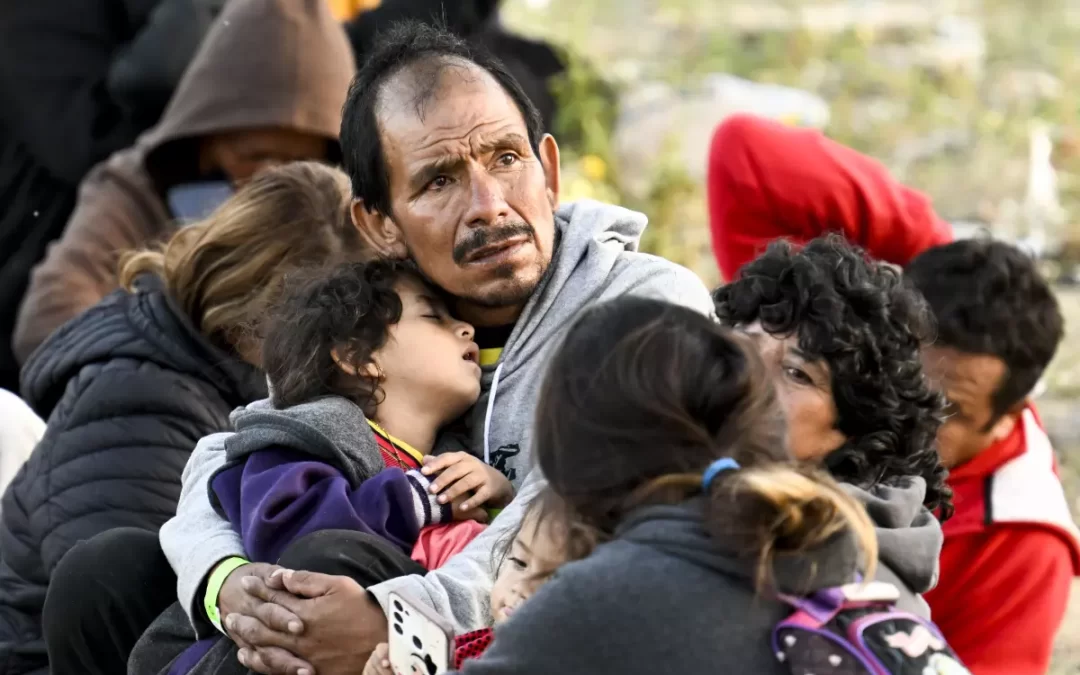The grave danger is to disown our neighbors. When we do so, we deny their humanity and our own without realizing it. — Pope Francis
Immigration seems like a big fat litmus test. At the root of that test is the way immigration brings us face to face with “the other” and with the illusion of separateness (the Big Lie).
We see the convergence of environmental, economic, and political issues, and how this convergence undermines the universal human needs of so many people, setting them in motion to seek the simple basics of life. And there doesn’t seem to be an end in sight.
Immigration challenges the status quo on many levels, including our feigned innocence. It’s grist for the mill of our collective journey toward psychological, ecological and spiritual maturity, and it’s a messy, awkward trip, uncomfortable by design.
I also suspect immigration is a predicament where it’s helpful to think less about solutions and more about responses.
Response #1: Prevention through Deterrence
Official response number one is and has been for some time, more militarization, weapons, walls, surveillance, arrests, prisons. It’s called “prevention through deterrence.” Top brass, for profit detention centers and other contractors may like it just fine.
To the thriving Military Industrial Complex, we now add the vast and ever growing Homeland Security apparatus. I’m just starting to learn about how inherently unjust and dehumanizing that apparatus is. How it attempts to maintain a status quo that can’t possibly hold.
To the extent to which political and policy responses perpetuate injustice and suffering, the blueprint is laid for a very grim future.
The Facilitator
We are all well versed now in the knowledge that there are great divides in what is perceived as reality; huge differences in worldview that do indeed divide us and make it extremely hard to address issues in effective ways.
I come in with my own views, my own worldview. But if I’m to put my restorative justice vision into practice I’ll need to hold a bigger picture. I’ll want to see and understand as much of the complexity as I can, hold as many different perspectives as I can.
Nonviolent Communication teaches that all human behavior revolves around meeting universal needs. I’ll try to see the needs, and varying strategies for meeting them, that are in play. This humanizes the whole thing and changes the whole dynamic.
The facilitator in me wants to see first hand if the current system is working for the rank and file and mid-level managers of Homeland Security and Border Patrol. What are their unmet needs in all of this?Are they okay with the harm and the litigation? If there are those willing to admit that the system takes a toll on them too, perhaps there are some small openings for restorative dialogue? These are the kinds of questions I want to explore.
The Opportunities
The psychological walls that underpin physical and policy barriers can weakening or strengthen. But all walls have their cracks and will eventually fall. Where are the cracks, the openings where the light can come in?
Can opportunities be creating for stepping back to see a bigger picture, to share experiences and views in such a way that people can really hear each other? Just that much. Can small cracks widen then?
Can we create opportunities for responsibility taking, for moving in the direction of compassion and care, for transformational shifts in priorities? Is there hope for humanity if we don’t?
It’s a long-term vision for sure, a long-shot probably. There is the very real possibility of continuing with separation—us and them, war and wall mentality, political quagmire, fear.
One thing seems clear: We will continue to come face to face with the consequences of our actions and with real flesh and blood people, lots of them, looking us in the face, challenging us to welcome the stranger.
Photo credit: Denis Poroy/AP


Thank you Ceci. It feels like an important time to honor all the relationships that serve our spirits. I’m grateful for our connection!
Scott: Your vision, wisdom and compassion comfort me. I find the intertwined issues of migration and climate chaos baffling and ever present. You blog gives me hope in the application of compassion and active peace. Thank you.